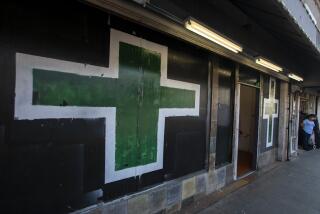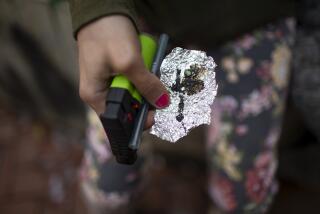New Cigarette Tax Sends Smokers Packing
- Share via
STATE LINE, Idaho — On a cold, wet Friday morning, the parking lot at the A to Z State Line Smoke Shop was packed with vehicles with Washington license plates.
After Jan. 1, when Washington raised its cigarette tax to $1.42 per pack, making it the highest in the nation, many smokers in border areas made resolutions to travel to Idaho or Oregon for cheaper smokes.
As a result, the drop in Washington cigarette sales is far higher than expected, Washington state officials said.
“We’ve talked with some of the retailers on the Washington side of the border and they said they’ve been cut almost in half,” said Carter Mitchell of the Washington Liquor Control Board, which is charged with blocking the import of untaxed cigarettes.
“On the Oregon side, they say sales have almost doubled,” said Mitchell, tax enforcement officer for the agency.
Smokers have plenty of incentive to rush across the border.
The state tax on a carton of cigarettes in Washington is $14.25. It’s just $2.80 in Idaho and $6.80 in Oregon, Mitchell said.
As a result, a carton of Marlboros that costs $30.99 in State Line costs $48.99 at the Albertson’s in nearby Liberty Lake, Wash.
A carton of Camels that costs $23.99 in State Line was also $48.99 at the Albertson’s.
It’s illegal to bring unlicensed cigarettes into Washington, so no one at State Line was much interested in discussing why they were buying cigarettes at the three smoke shops near Interstate 90.
Employees of the shops were also reluctant to talk about their new customers, fearing publicity would bring increased law enforcement and scare off the windfall business.
“We respect the privacy of our customers,” said a woman who worked at the A to Z. “People fear the sting. If they get caught with them, it’s up to a $5,000 fine.”
Washington cigarette shop owners were less reticent.
“January has always been my busiest month of the year because of snow,” said Brian Mealey, owner of the Tobacco Station in Spokane. “This January was one of the slowest months I ever had. It definitely affected us.”
Mitchell said it is unclear if the flurry of out-of-state sales will continue or taper off.
The new tax increase was passed as Initiative 773 in November with 66% of the vote. It raised the tobacco tax by 60 cents a pack, with the money slated for health care for the poor.
About 24% of Washington adults smoke, and the new tax was expected to cost a pack-a-day smoker $220 a year. It was expected to raise $120 million a year in new revenue, but that is unsure because of the drop in sales.
There’s nothing new about people in border areas traveling for a good deal. Many in Washington, where the sales tax is more than 8%, shop across the border in Oregon, which doesn’t have a sales tax.
Washington residents have also long been able to get cheaper cigarettes on Indian reservations and military bases, which do not charge the state tax.
Even before the tax was raised, one of every three packs of cigarettes in Washington was not taxed by the state, said Mike Gowrylow of the Department of Revenue. Two-thirds of those cigarettes were bought on Indian reservations or military bases. One-third were smuggled in from other states.
Legislators expected a certain amount of lost sales with the increased tax.
Washington regulators have widely publicized that they are patrolling border areas, looking for contraband smokes. But the reality is they are not.
State agents have not made a single stop on cigarette violations since the higher tax went into effect, Mitchell said.
Enforcing such a law is labor-intensive. Officers would have to witness someone buying cigarettes, follow them across the border, and then pull them over, issue a ticket and take the smokes as evidence, Mitchell said. The crime is a gross misdemeanor, and violators can be charged a minimum of $250 or $10 a pack, whichever is higher.
’
More to Read
Sign up for Essential California
The most important California stories and recommendations in your inbox every morning.
You may occasionally receive promotional content from the Los Angeles Times.













